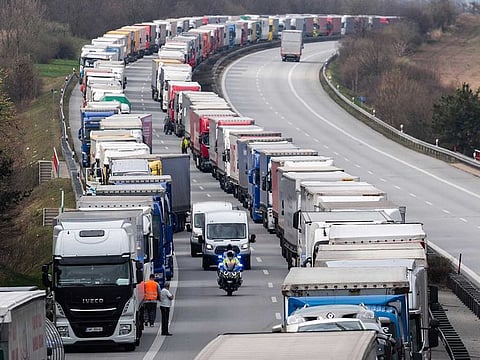Coronavirus cases in Germany soar past 10,000
Chancellor Merkel says country facing biggest challenge ‘since Second World War’

Berlin: (AFP) Germany has recorded 10,999 cases of the novel coronavirus, official data showed Thursday, with the number of new reported infections rising by 2,801 in a single day.
Twenty people have died from the viral infection, data from the disease control agency Robert Koch Institute (RKI) showed.
North Rhine-Westphalia remains the worst-hit state, with 3,033 COVID-19 cases, up 661 from a day ago.
The data is compiled from regional authorities of cases tested for the virus. But depending on an individual state’s policies, many other possible cases may not have been tested because they show only mild symptoms or have not been in contact with a known case.
With the contagion showing no signs of abating authorities have ordered schools closed, non-essential shops shut and made repeated calls for Germans to stay home.
With the pleas appearing to fall on the deaf ears of some, two small Bavarian villages have imposed a lockdown.
Leaders in bigger cities and regions have also warned that they may be forced to take tougher action.
“I cannot and will not rule out taking further measures in the coming days,” Berlin mayor Michael Mueller said Wednesday.
“The question of a lockdown can play a role. That can be decided quickly. In that case, the parks and gardens will be closed,” he warned.
Merkel makes appeal in television address
Earlier, in a television address, Chancellor Angela Merkel said Germany is facing its biggest challenge “since the Second World War” in the fight against the coronavirus pandemic.
In her dramatic appeal, Merkel urged everyone to play a part in slowing down a virus that has raced across the globe and triggered unprecedented peace-time lockdowns.
“The situation is serious. Take it seriously. Not since German reunification, no, not since the Second World War has our country faced a challenge that depends so much on our collective solidarity,” she said.
Although her 15 years in office have been marked by blows like the financial crisis, the 2015 refugee crisis and Brexit, the veteran leader has never taken to the airwaves to address citizens directly outside of traditional New Year’s greetings.
“I truly believe we can succeed in this task, if all citizens truly understand their own tasks,” Merkel said.
Federal and local governments have shut down schools, many businesses and public spaces in recent days in increasingly desperate attempts to slow the spread of the virus.
The country has however stopped short of ordering people to stay home, in contrast with the tougher restrictions introduced in France, Belgium, Italy and Spain.
Yet Germans have continued to go outside to enjoy the spring sunshine and socialise, even holding “corona parties” as the authorities’ struggle to hammer home the message that people must avoid social contacts.
More border checks
Merkel, who hails from Germany’s former communist East, said she understood how hard it was to give up “hard-fought rights” like freedom of movement and travel.
Such decisions were never taken lightly in a democracy, she said, and could only be temporary. “But they are necessary right now to save lives.”
Europe’s top economy on Monday introduced strict checks on its land frontiers with France, Austria, Luxembourg, Denmark and Switzerland, allowing through only cross-border commuters and delivery trucks.
The German interior ministry expanded those restrictions on Wednesday evening to include European air and sea traffic.
Starting immediately, there will be checks on flights arriving from Italy, Spain, France, Austria, Switzerland, Denmark and Luxembourg as well as on ships arriving from Denmark.
Those with “an urgent reason for travel and professional commuters” will be asked to show documentation to justify their arrival, the ministry said in a statement, while others will be denied entry.
Hotels as hospitals
Merkel’s historic speech echoed that of French President Emmanuel Macron, who in a sombre address on Monday likened the outbreak to war after ordering almost the entire population to stay at home for at least two weeks.
The Robert Koch Institute (RKI) for public health warned there could be 10 million cases within two to three months if people do not avoid contact.
“Germany has an excellent health system,” Merkel said, thanking doctors and other medical workers “on the front line for us in this battle”.
Nevertheless, “even our hospitals will be overwhelmed if too many patients are brought in with serious symptoms of the coronavirus in a short time”, the conservative leader added.
To ramp up medical capacity, German state and federal governments announced steps Wednesday to double intensive respiratory care and commandeer new spaces for treatment.
Germany currently has around 25,000 intensive care beds with respiratory capacity, and Berlin has ordered thousands of new respirators to boost that number.
Federal and state officials meanwhile said spaces like hotels, rehabilitation centres and public halls could be converted into spaces for treating people with milder symptoms.
In her speech, Merkel reiterated that Berlin “will do everything it can to cushion the economic impact and preserve jobs” and discouraged citizens from hoarding.
“Even if some (supermarket) shelves are emptied on one day, they will be replenished,” she promised, adding her thanks to those working in the food industry.







